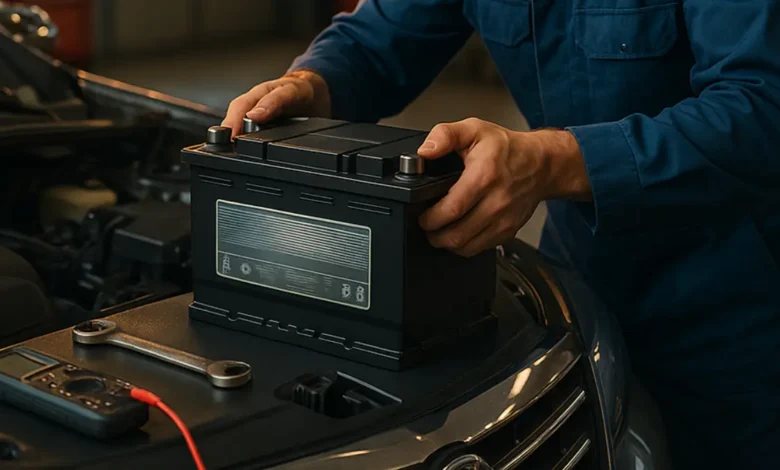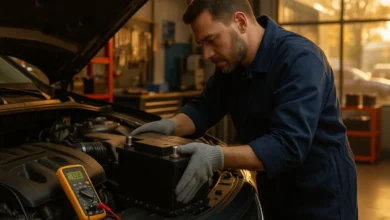How Much Is a Car Battery – Complete Expert Guide to Costs and Smart Choices

Wondering how much is a car battery? Learn expert insights on car battery prices, types, lifespan, and smart buying tips to save money and keep your vehicle running reliably.
When drivers ask how much is a car battery, it usually means they’re about to face one of those unexpected car expenses that seem small but important. The truth is, car battery prices can vary widely depending on type, technology, brand, and where you buy it. A battery can be as affordable as a dinner out or as pricey as a new smartphone.
The average car battery lasts several years, but when it’s time to replace it, understanding what goes into the price helps you make smarter choices. This guide breaks down every detail—from materials and labor costs to brands and maintenance tips—so you’ll know exactly what you’re paying for.
What Affects the Cost of a Car Battery
Many factors influence how much a car battery costs. Knowing them makes you less likely to overpay and more confident about your purchase.
Battery Type and Technology
The type of battery is the first big factor in cost. Standard flooded lead-acid batteries are usually the most affordable. They work well for everyday vehicles with basic electrical systems. On the other hand, advanced types like Absorbent Glass Mat (AGM) or lithium batteries cost more because they’re built to last longer, resist vibration, and perform better in extreme temperatures.
AGM batteries are common in modern cars with start-stop technology or vehicles packed with electronics. They handle deep discharges better and need less maintenance. That added performance justifies their higher price.
Brand, Warranty, and Build Quality
Some brands charge more because they’re trusted and backed by long-term warranties. A reliable brand ensures better materials, consistent performance, and dependable support. While generic batteries might seem like a bargain, they often come with short warranties and may fail sooner. Paying a little extra for quality can save you money and stress later on.
Battery Size and Vehicle Type
Every car requires a specific battery size and power output. Small compact cars use smaller, cheaper batteries, while SUVs, trucks, and luxury vehicles need larger ones with higher capacity. Specialty vehicles or those with high electrical loads, such as heated seats and entertainment systems, require stronger batteries that cost more.
Performance Ratings
Cold Cranking Amps (CCA) and Reserve Capacity (RC) ratings directly impact the cost. Higher CCA means better starting power in cold weather, and higher RC means your car can run accessories longer if the alternator fails. Premium performance means higher price—but also greater reliability.
Typical Car Battery Price Ranges
Car battery prices vary based on market and vehicle needs. A standard battery for an average car often falls within a modest price range, while advanced options cost more.
Regular lead-acid batteries for basic vehicles are typically at the lower end. Maintenance-free and AGM types cost more because of improved technology. High-performance or specialty batteries, such as those used in off-road or luxury vehicles, sit at the top end.
Electric or hybrid vehicles also have auxiliary 12-volt batteries that can be much more expensive due to their complex design. Even within one brand, different series can vary in price depending on warranty and durability.
What Makes Up the Total Price
When asking how much is a car battery, remember you’re paying for more than just the part itself. There are several hidden or indirect costs built into the price.
Materials and Manufacturing
The core materials inside a car battery—lead, acid, casing, and connectors—all influence price. Batteries with thicker lead plates, better separators, or sealed designs cost more to produce. As raw material prices rise, so does the final retail price.
Shipping, Handling, and Environmental Fees
Batteries are heavy and require careful handling due to hazardous materials. Shipping and environmental fees add to the cost. In many areas, stores charge a refundable core fee that you get back when returning the old battery for recycling.
Labor and Installation
If you choose professional installation, expect additional labor charges. In simple cases, installation may be free, but vehicles with difficult battery placement, such as those with batteries under the seat or trunk, require extra work.
Warranty and After-Sales Support
A battery with a longer warranty often costs more because the manufacturer factors in the potential cost of replacements or service. That said, longer warranties give peace of mind and can be worth the investment.
Cost Comparison by Vehicle Type
| Vehicle Type | Battery Type | Average Price Range |
|---|---|---|
| Compact Car | Standard lead-acid | Affordable range |
| Sedan or SUV | Maintenance-free or midrange AGM | Moderate range |
| Luxury Vehicle | Premium AGM | Higher range |
| Heavy Duty or Off-Road | Deep-cycle or performance battery | Higher range |
| Electric or Hybrid (Auxiliary) | Specialized design | Variable, premium range |
These are general price levels that shift with market changes and location differences.
How to Choose the Right Car Battery
Choosing the right battery goes beyond just asking how much is a car battery. It’s about getting the best match for your car and driving habits.
Check Your Vehicle Specifications
Always start with your car’s manual. It lists the recommended battery group size, terminal configuration, and required cold cranking amps. Sticking to these ensures proper fit and performance.
If you pick a battery with slightly higher ratings, that’s fine—it’ll provide more reliability under stress. But choosing too small or incorrect specs may cause trouble for your electrical system.
Balance Price with Value
Instead of focusing solely on price, consider lifespan, warranty, and performance. A cheaper battery replaced twice in four years costs more than a premium one lasting six. Aim for a reliable midrange option that offers strong performance for your environment.
Compare Options Before Buying
Visit local auto shops, service centers, and online stores to compare warranties, installation options, and core return policies. Many retailers offer free testing and installation if you buy directly from them.
When to Replace Your Car Battery
Understanding when to replace helps you avoid getting stranded.
Typical Battery Lifespan
Most car batteries last between three and six years depending on use and climate. If your battery is older than three years, have it tested regularly to catch early signs of decline.
Warning Signs
If your engine cranks slowly, lights dim, or electrical accessories behave erratically, your battery is likely weakening. Corrosion on terminals, swelling, or fluid leakage are also red flags that it’s time to replace.
Simple Steps for Safe Battery Replacement
Replacing a battery isn’t too complicated, but safety matters.
Always start by turning off the ignition and removing the negative terminal first. Then remove the positive terminal, take out the old battery, and place the new one in securely. Reconnect the positive terminal first, then the negative. Double-check connections and tighten clamps firmly.
If your vehicle has complex electronics or sensors linked to the battery, let a technician handle it. Professional replacement ensures your systems reset properly.
How to Make Your Battery Last Longer
Getting the best value means extending your battery’s life as much as possible.
Keep Terminals Clean
Corrosion causes voltage drops and charging issues. Clean terminals periodically with a baking soda and water solution or a specialized cleaner.
Drive Regularly
Frequent short trips prevent full charging. If you don’t drive often, use a trickle charger to maintain charge levels.
Limit Electrical Drain
Avoid leaving lights or accessories on when the engine isn’t running. Modern cars have parasitic drains from electronics, so keeping the system healthy helps your battery last.
Manage Temperature Exposure
Extreme heat or cold shortens battery life. Parking in shaded or enclosed areas can reduce heat exposure and slow chemical wear.
Regular Testing
Test your battery yearly after it hits three years old. Quick voltage checks can alert you to problems before they lead to failure.
Expert Tips Before Buying a New Battery
- Ask for price breakdowns, including installation and recycling.
- Check for sales, seasonal discounts, or rebates.
- Keep the purchase receipt and warranty details safe.
- Return the old battery to reclaim your core charge refund.
- Ensure your alternator is healthy before replacing a battery, since charging issues often mimic battery failure.
Frequently Asked Questions
Why does the price of car batteries vary so much?
Different materials, technologies, and warranties make prices fluctuate. Premium batteries last longer and perform better, while budget ones cost less but wear out faster.
How can I tell if my battery is dying?
Slow engine starts, dim headlights, or clicking noises when turning the key are common signs. Testing at an auto shop confirms battery health quickly.
Should I buy an AGM battery for my car?
If your car supports it, AGM is worth it for better durability and longer life. However, standard cars without high electrical demands do fine with regular batteries.
Can I replace my battery myself?
Yes, if you follow safety steps and have basic tools. But professional installation ensures correct fitment and avoids electrical system errors.
What’s the best brand to buy?
There isn’t one single best brand. Go for reliable names with proven warranties and good customer reviews. Local availability and service support matter too.
Does weather affect how much a car battery costs?
Not directly, but harsh climates influence demand. In cold or hot regions, stronger batteries sell faster, sometimes driving up prices.
Are there extra fees I should know about?
Some stores charge a core deposit, which is refunded when you return the old battery. Others might include recycling or installation fees.
Conclusion
Understanding how much is a car battery helps you plan better, choose smarter, and save money in the long run. Prices vary based on type, quality, and location, but a balanced choice often gives the best value.
A car battery may not be the most glamorous part of your vehicle, yet it’s the heart of every start. Investing wisely ensures smooth performance and fewer breakdowns. Take care of your battery, and it will take care of your car.





